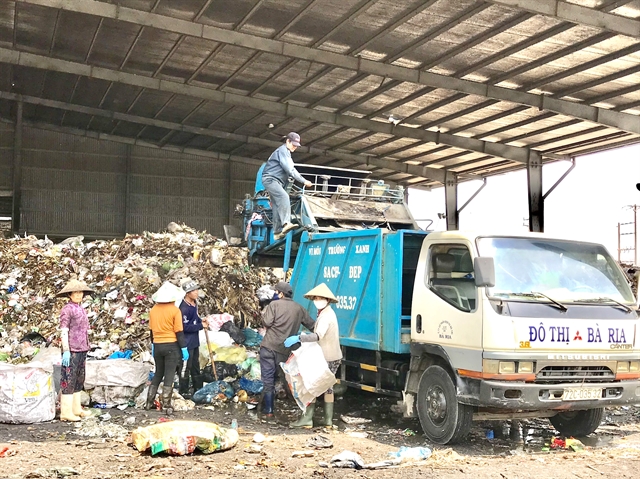 Society
Society

The province has only one project treating domestic solid waste by burying technology, which is being overloaded.

|
| Rubbish is collected at the Tóc Tiên landfill in Bà Rịa-Vũng Tàu Province. — VNA/VNS Photo Hoàng Nhị |
BÀ RỊA-VŨNG TÀU — Despite plans to recycle and not bury solid waste, Bà Rịa-Vũng Tàu Province is struggling due to a lack of technology and approved projects.
The province has only one project treating domestic solid waste by burying technology, which is being overloaded.
Only one of three projects approved for domestic solid waste treatment is operating.
It is the project of the KBEC Vina Co Ltd in the 38-hectare Tóc Tiên landfill.
This project is burying the rubbish with a capacity of about 920 tonnes per day.
However, the landfill is currently overloaded and is creating many environmental problems affecting people's lives.
The Bảo Ngọc Green Environment Joint Stock Company has not yet completed the relocation from Phước Hòa Ward, Phú Mỹ Town, to the Tóc Tiên landfill, so it cannot start work.
The last, a project of the Láng Dài Waste Treatment Complex in Đất Đỏ District invested by the Green HC Co Ltd, has an area of 50ha. Its capacity is 299 tonnes per day and is divided into two phases.
The company has completed 90 per cent of phase one. But the provincial Department of Natural Resources and Environment (DONRE) said it was delayed for three years and was no longer suitable, so the project was halted.
A provincial DONRE report showed that the amount of solid waste has increased, whereas rubbish collection was overloaded, causing environmental pollution.
At present, the amount of rubbish is about 920 tonnes per day. However, it is forecast to reach 1,590 tonnes per day by 2025.
In the Côn Đảo Island District only, the rubbish is buried at the Bến Đầm Port. Currently, about 70,000 tonnes are not treated, giving out a bad smell.
In 2019, the Côn Đảo District intended to press the rubbish into blocks and transport it to the mainland for treatment at the cost of more than VNĐ70 billion (US$2.9 million).
Then after careful consideration and calculation, the province's leaders abandoned this plan because of the high cost of packaging and transportation.
Solutions
Faced with the problem, the province plans to select an investor soon to implement the project of burning waste by power generation technology in the Tóc Tiên landfill. Funds will be called for from organisations and individuals.
Đặng Sơn Hải, deputy director of the provincial DONRE, said that the department sent the plan to the provincial people's committee.
The plant to treat solid rubbish will have the capacity of about 1,000 tonnes per day, with an area of no more than five hectares.
The technology must be certificated by the Ministry of Natural Resources and Environment, the Ministry of Science and Technology and concerned ministries and meet national standards on environmental protection.
The DONRE also asked the provincial people's committee for permission to build a plant to treat solid waste in Côn Đảo Island District.
The plant will have a capacity of no more than 50 tonnes per day and will be divided into two phases. The first phase is to 2030 with 30 tonnes per day, and the second is 2040 with 50 tonnes per day.
The plan will have an investment of about VNĐ60 billion ($2.5 million) and an area of 1.9ha.
Priority will be given to technology lines from developed countries, meeting national regulations and standards on safety, energy saving and environmental protection.
Hải added that the department was collecting opinions to prepare for a project on solid waste management and classification at its source in the period 2022-25, with an orientation to 2030.
The project targets that by 2025, the province will reduce the proportion of waste treated by burial to less than 30 per cent; reuse and recycle most of the organic waste in rural areas. — VNS




